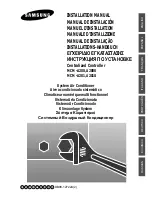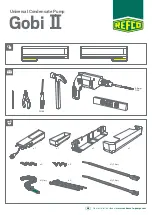
EN
ES
FR
IT
DE
PT
PL
CZ
RU
CR
HU
TR
NL
GR
SV
FI
NO
DK
RO
BG
EE
LV
SK
SI
6
CAUTION
Refrigerant Piping Connection
1. Cut the pipe with a pipe cutter.
2. Insert a
fl
are nut into the pipe and
fl
are the pipe.
•
Projection margin in
fl
aring : A (Unit : mm)
Rigid (clutch type)
Obliquity
Roughness
Warp
90
Imperial (wing nut type)
Outer dia. of copper pipe
R410A
6.35
1.5 to 2.0
9.52
1.5 to 2.0
12.70
2.0 to 2.5
Die
Pipe
A
Align the centers of the connecting pipes and tighten the
fl
are nut as far as
possible with your
fi
ngers. Then tighten the nut with a spanner and torque
wrench as shown in the
fi
gure.
Tightening connection
Do not apply excess torque. Otherwise, the nut may crack depending on
the conditions.
(Unit : N·m)
Outer dia. of copper pipe
Tightening torque
Ø6.35 mm
16 to 18 (1.6 to 1.8 kgf·m)
Ø9.52 mm
30 to 42 (3.0 to 4.2 kgf·m)
Ø12.70 mm
50 to 62 (5.0 to 6.2 kgf·m)
Evacuating
After the piping has been connected to the indoor unit, you can perform the
air purge together at once.
AIR PURGE
Evacuate the air in the connecting pipes and in the indoor unit using a
vacuum pump. Do not use the refrigerant in the outdoor unit. For details,
see the manual of the vacuum pump.
Outer dia.
of copper pipe
R410A tool used
Conventional tool
used
6.35
0 to 0.5
1.0 to 1.5
9.52
0 to 0.5
1.0 to 1.5
12.70
0 to 0.5
1.0 to 1.5
Use a wrench to secure.
Use a torque wrench to tighten.
Flare nut
Half union
Internally
threaded side
Externally
threaded side
•
Tightening torque of
fl
are pipe connections
Flare at
indoor unit side
Flare at
outdoor unit side
The operating pressure of R410A
is higher than that of R22 (approx.
1.6 times). It is therefore necessary
to
fi
rmly tighten the
fl
are pipe
connecting sections (which connect
the indoor and outdoor units) up to the
speci
fi
ed tightening torque. Incorrect
connections may cause not only a
gas leakage, but also damage to the
refrigeration cycle.
1. How to shape the pipes
Shape the pipes along the incused line on
the outdoor unit.
2. How to
fi
t position of the pipes
Put the edges of the pipes to the place with
a distance of 85 mm from the incused line.
Shaping pipes
Incused line
Flaring
Be sure to use a vacuum pump with counter-
fl
ow prevention function so that
inside oil of the pump does not
fl
ow backward into pipes of the air conditioner
when the pump stops.
(If oil inside of the vacuum pump enters the air conditioner, which use R410A,
refrigeration cycle trouble may result.)
1. Connect the charge hose from the manifold valve to the service port of the
packed valve at gas side.
2. Connect the charge hose to the port of the vacuum pump.
3. Open fully the low pressure side handle of the gauge manifold valve.
4. Operate the vacuum pump to start evacuating. Perform evacuating for about
15 minutes if the piping length is 20 meters. (15 minutes for 20 meters)
(assuming a pump capacity of 27 liters per minute) Then con
fi
rm that the
compound pressure gauge reading is –101 kPa (–76 cmHg).
5. Close the low pressure side valve handle of the gauge manifold valve.
6. Open fully the valve stem of the packed valves (both gas and liquid sides).
7. Remove the charging hose from the service port.
8. Securely tighten the caps on the packed valves.
Using a vacuum pump
Packed valve at liquid side
Service port (Valve core (Setting pin))
Packed valve at gas side
Vacuum
pump
Vacuum pump adapter for
counter-
fl
ow prevention
(For R410A only)
Charge hose
(For R410A only)
Handle Hi
(Keep full closed)
Manifold valve
Pressure gauge
Compound pressure gauge
Handle Lo
Charge hose
(For R410A only)
Connecting pipe
–101 kPa
(–76 cmHg)
• Open the valve stem all the way out, but do not try to open it beyond the
stopper.
• Securely tighten the valve stem cap with torque in the following table:
Packed valve handling precautions
m
m
4
The hexagon wrench
is required.
Gas side
(Ø12.70 mm)
50 to 62 N·m
(5.0 to 6.2 kgf·m)
Gas side
(Ø9.52 mm)
30 to 42 N·m
(3.0 to 4.2 kgf·m)
Liquid side
(Ø6.35 mm)
16 to 18 N·m
(1.6 to 1.8 kgf·m)
Service port
9 to 10 N·m
(0.9 to 1.0 kgf·m)
Wiring Connection
1. Remove the valve cover from the outdoor unit.
2. Connect the connecting cable to the terminals as identi
fi
ed with their
respective matched numbers on the terminal block of indoor and outdoor
unit.
3. When connecting the connecting cable to the outdoor unit terminals, make
a loop as shown in the installation diagram of indoor and outdoor unit to
prevent water coming in the outdoor unit.
4. Insulate the unused cords (conductors) from any water coming in the
outdoor unit. Proceed them so that they do not touch any electrical or
metal parts.
CAUTION
•
KEEP IMPORTANT 5 POINTS FOR PIPING WORK.
(1) Take away dust and moisture (inside of the connecting pipes).
(2) Tighten the connections (between pipes and unit).
(3) Evacuate the air in the connecting pipes using a VACUUM PUMP.
(4) Check gas leak (connected points).
(5) Be sure to fully open the packed valves before operation.
1110251217-EN.indd 6
1110251217-EN.indd 6
2/3/10 10:46:50 AM
2/3/10 10:46:50 AM










































